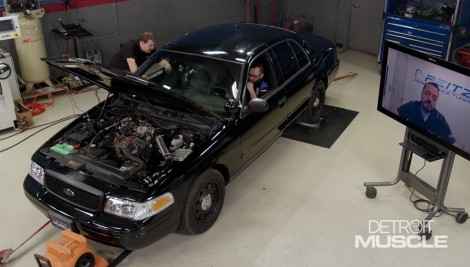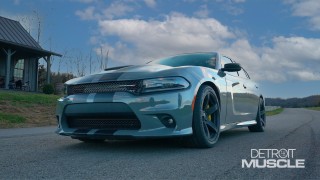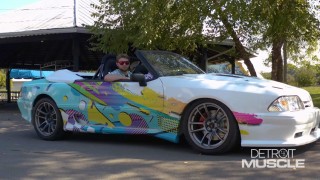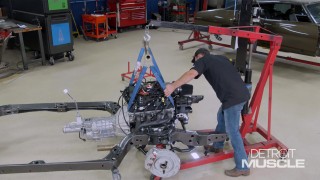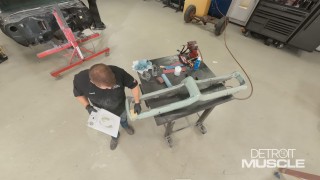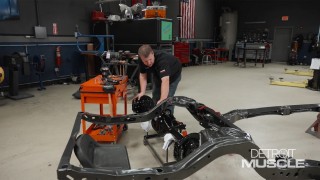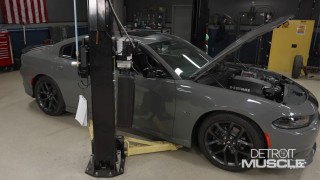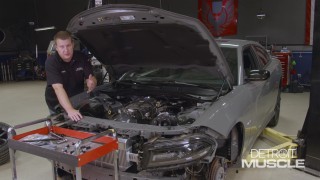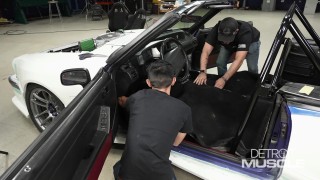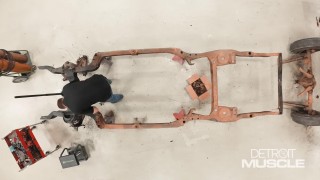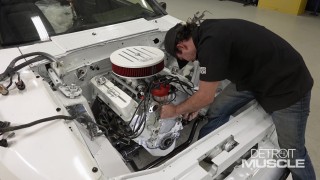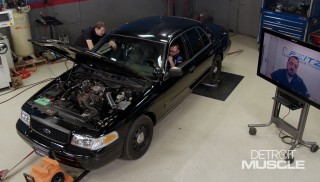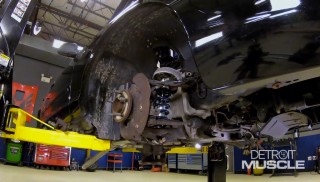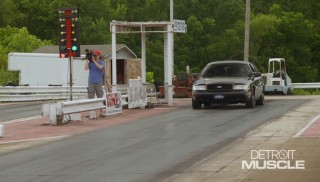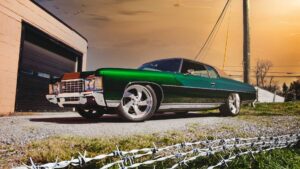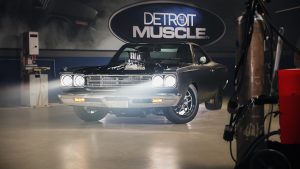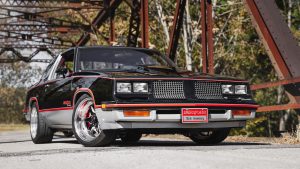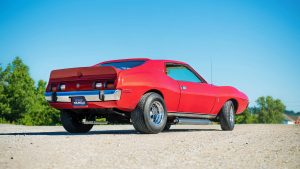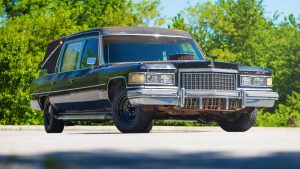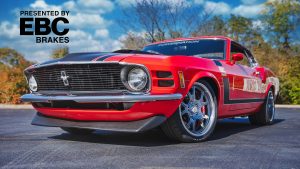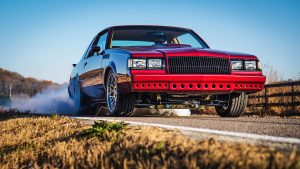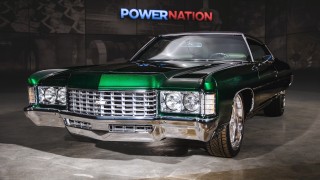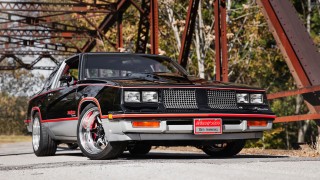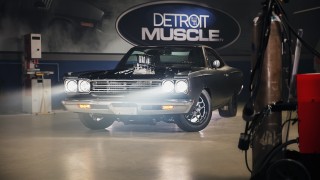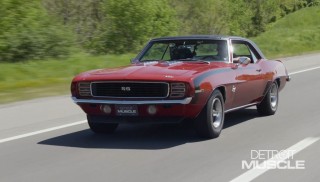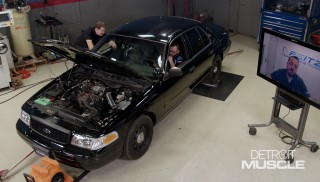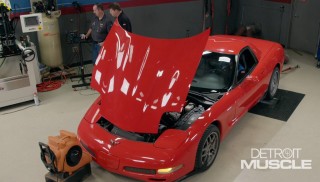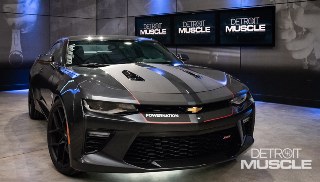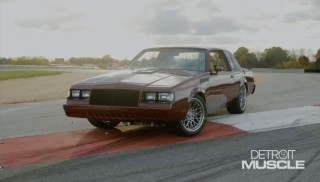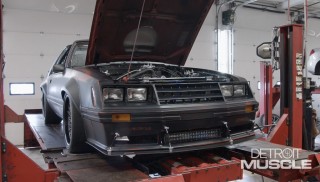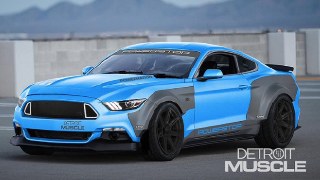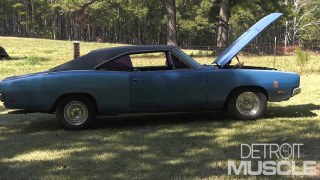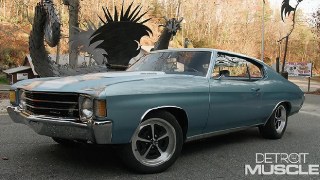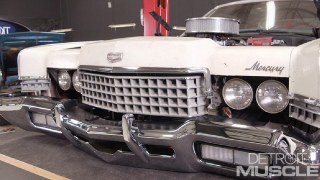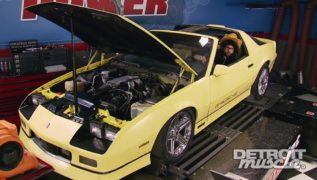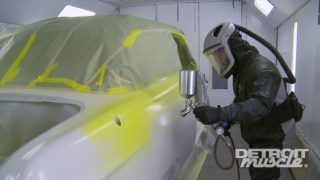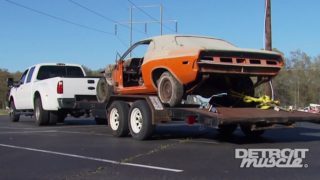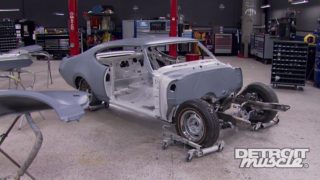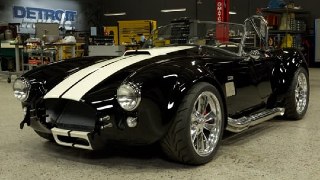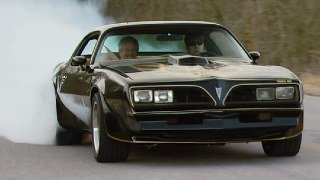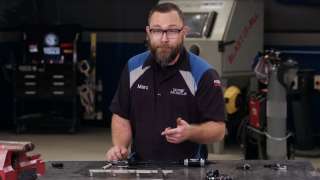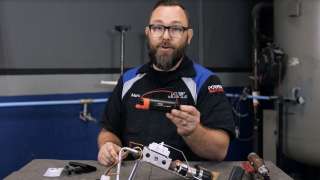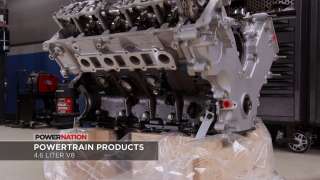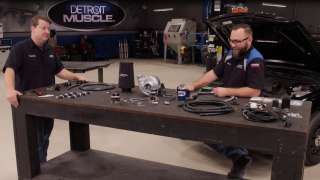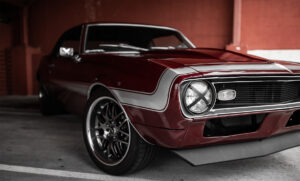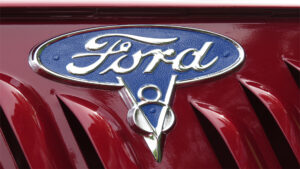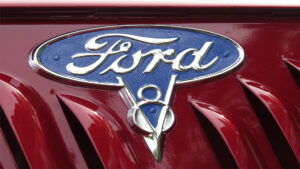More Crown Vic Police Interceptor Episodes
Detroit Muscle Featured Projects
Detroit Muscle Builds
Want more content like this?
Join the PowerNation Email NewsletterParts Used In This Episode
Matco Tools
MATCO Tools are the Official Tool Supplier to PowerNation
The Industrial Depot
Tools, Hardware, Shop Supplies
Video Transcript
(Tommy)>> I found our next project from some hard time inspiration.
(Marc)>> We take an old cop car and turn it into a turbocharged sleeper and nearly double the horsepower. [ Music ] [ engine revving ] [ Music ]
(Tommy)>> Well over a weekend getaway I guess you could say I had a bit of time on my hands to ponder a few things like a new project to work on when I get back to the shop.
(John)>> See that? The cars, you, that's you.
(Tommy)>> And while I was on this small vacation I had the opportunity to talk with the locals.
(John)>> See those cars, you, right there.
(Robert)>> I think we got him.
(Tommy)>> You could say they're familiar with what I had in mind and they're pretty good at doing their research.
(John)>> Look at me. Do you know how much this would costs? Do you have any idea? Oh yeah, Street Regal. You think Hard Charger's gonna save you? I don't think so, no!
(Tommy)>> So I just had to run this great idea by my old buddy. Plus I needed to catch up with him anyways. Hey man it's Tom. Brother I need you to help me out. I'm in kind of a pinch here. It's only a couple grand. Come on man! Heck I've helped you before and didn't tell nobody about it. Come on! Hello? Man that was my only call. [ Music ] Tell big mama thanks. [ Music ] You don't mind if I ride up front do you?
(Marc)>> I guess. [ Music ]
(Tommy)>> I don't know what this dude's problem is. Heck he's a Ford man through and through. He must not be used to these fine amenities. [ Music ] So man what do you think about this jewel?
(Marc)>> I don't like it. It's got four doors. It ain't no Cadillac.
(Tommy)>> This old girl's got a lot of potential.
(Marc)>> I don't think so. [ Music ] This thing? [ Music ] It's great if you've got to read a map. [ Music ] Unreal.
(Tommy)>> I bet that skinny pedal will change your mind. Alright big man, pin it! [ engine revving ] [ Music ]
(Tommy)>> This thing's got the four point six liter police interceptor, and with that cop suspension, cop brakes, cop rear axle, and cop wheels.
(Marc)>> I guess it's not so bad after all.
(Tommy)>> Told you. [ engine revving ]
(Tommy)>> This thing's gonna be a whole lot of fun. [ Music ]
(Marc)>> That's right, we got ourselves a 2008 Ford Crown Victoria P-71 police interceptor. Now this thing is 4,000 pounds. It's got a full frame under it. It's not fast. Four doors and about 250 horse under the hood. Now by no means is this thing a muscle car by any definition but it does share that two valve V-8 with the Mustang G/T. So you can do some bolt on parts like a throttle body, cold air kit, things like that, underdrive pulleys. It's really gonna get a little bit of power. You can even do long tubes but bang for your buck that's not where it's at. We need big power and we need it quick.
(Tommy)>> I've got the solution right here and that isn't yo mama's hair dryer big guy.
(Marc)>> I love it! Is this like a direct for this car?
(Tommy)>> This is a direct universal kit that only takes a little bit of modifying to make it fit whatever you want to.
(Marc)>> That's okay though cause that means it's perfect for us and perfect for this car.
(Tommy)>> Yeah for sure cause this old thing being an odd duck like it is, well, sometimes you've got to think outside the box.
(Marc)>> And this thing mounts in the back right? STS?
(Tommy)>> This is a tailpipe turbo. So we don't have to fool with the intercooler up front. So it's actually gonna save us a bit of time.
(Marc)>> We just have to do quite a bit of plumbing.
(Tommy)>> But it's gonna be worth it.
(Marc)>> Yeah it's gonna be awesome. I love it! I'll tell you what. You go get a welder and a torch, I'll get the battery disconnected and get this thing in the air.
(Tommy)>> I've got a metric shoehorn that's gonna help.
(Marc)>> Perfect!
(Tommy)>> We start installing the turbo with a little help.
(Marc)>> Then we attack the fuel system and take it to the dyno.
(Marc)>> We're working on the turbo install on our Crown Victoria police interceptor. I've got the exhaust cut off behind the cats all the way to the back, and mounted the turbo right here where the driver's side muffler used to live. Tommy made this really cool bracket, welded it in solid, and now it's just time to do a whole bunch of plumbing.
(LT)>> That's on purpose right, cause normally they belong up front?
(Marc)>> Yeah this is on purpose. There's like a method to this madness. You know you run the charge pipe up here and it just acts as the intercooler as it goes up and just plumb it right into the engine. It's magic!
(LT)>> Yeah it's low key for sure, it's hidden. You won't see anything under the hood I guess if you're going for a sleeper kinda look.
(Marc)>> Well I'm glad you're here because I know you've done turbo kits before. I was kinda hoping you would give me some pointers on how to route these tubes front to back. The hot and the cold side.
(LT)>> It's pretty simple from where you're at. All you've got to do is connect the exhaust into the turbine. That'll spin the turbocharger. Then you've just got to get the fresh air from the compressor housing all the way up front. So a couple of straight runs of tube. Maybe a jog over, but really the first thing you've got to do is mount the other turbo.
(Marc)>> No, it's just the one. I mean what do you want?
(LT)>> Two, I want two turbos.
(Marc)>> No, this is gonna be enough, trust me. Stock engine, we don't want to blow this thing up.
(LT)>> Alright where's the tube at?
(Marc)>> It's right over there. Wait, you're gonna help?
(LT)>> Yes! [ Music ] Start somewhere in there. So really the first thing that I'm trying to do here is get this driver's side exhaust shoved over as far as we can in this hump in the crossmember because we're gonna have to have the cold charge pipe coming up in this same space. So we've gotta save room where we can. I think this one's just about ready to weld. [ welder crackling ] [ Music ]
(LT)>> I think we're off to the races.
(Tommy)>> Now we're talking hot side, cold side when it comes to that turbocharger, and for those of you who don't know what that means let me show you. Turbochargers are forced induction devices that use exhaust energy to cram more air into an engine. Exhaust flow from a header drives the blades of a turbine wheel before it discharges. On the other side an aluminum impeller wheel draws in and compresses fresh air. These wheels ride on a close tolerance shaft that can spin well over 100,000 r-p-m. Race motor turbos can easily increase intake pressure by as much as 50 pounds.
(LT)>> Because the guys are running a single turbocharger on a V-8 application we've got to get exhaust from both banks into a single two and a half inch pipe. Now you can buy a Y-pipe off the shelf but this is a budget build. So we're gonna make our own. I'm gonna start with two of these 45 degree bends and cut them right after the radius. Then I'm gonna come through and cut them kind of along the length here, and stick them together. That way I can connect the two and a half inch pipe right on the end, and there you go. You've got your own Y-pipe. Once I have the two halves of the "Y" exactly where I want them I'll tack everything together, and then trim off the end so it first perfectly with the two and a half inch pipe. [ Music ] [ welder crackling ]
(LT)>> Once everything's mocked up I'll fully weld the front half of the system together.
(Marc)>> While all that's being done I'm gonna be working on the oiling system. Turbos have to have pressurized oil fed from the engine into the top. There's a fitting up here where it goes in, and there's got to be a return line that goes back to the engine. That's what this is right here at the bottom. It's called an oil drain back. Now if you have a remote mount turbo like we have, or if your turbos are mounted low, you need a pump to help get that oil back to the engine and that's what this is right here, this scavenge pump. I'm just gonna mount it to the frame right here. This is gonna be the inlet, and then it's gonna come out here back to the engine. I just have to plumb from here to here, and from here to the engine, and of course before I do that I need to get this thing mounted to the frame. [ Music ]
(LT)>> Now all we've got to do is connect that to the turbo and we're in business. The process on the rear half is exactly the same as the front. Trim the pipe until you're happy and weld it together. I'm gonna weld it up. { welder crackling ]
(Marc)>> Now look at that. That looks good! Why do these welds not look as nice as the ones you do on your projects though?
(LT)>> Well you said you wanted down and dirty. You wanted quick. You have gave me aluminized tubing and a mig welder. So that's what you got.
(Marc)>> Well that's what we wanted, it's perfect.
(LT)>> Alright well the hot side is pretty much wrapped up. The exhaust will make its way nice and smoothly into the turbine. The only thing you're gonna have to do is finish welding this V-band ring on there cause you probably need to take the turbo off just to get to it, and then the waste gate. Somebody's gonna have to punch a hole in this elbow right here. Get that thing mounted up to keep the boost levels under control.
(Marc)>> Yeah we can do that. We've got to make a tailpipe for it anyway, and we've got to wire up the scavenge pump. Get an air filter on here, and then run the charge pipe to the front, but other than that I think we're done underneath.
(LT)>> Yeah so other than physically mounting the turbo and plumbing it what other changes are you gonna make to the car to make it all run together?
(Tommy)>> We're gonna upgrade the fuel system, starting with the pump, swapping in some bigger injectors, and then throw in the tune, and she should fire right up.
(Marc)>> Yep gonna keep it simple.
(LT)>> You guys got any horsepower goals for this thing?
(Tommy)>> He's pretty ambitious.
(Marc)>> I'd like to make 400 at the tire.
(LT)>> Well I want to hear this thing run when you're done but I've got to get back to work for now. So let me know.
(Tommy)>> Sure thing.
(Marc)>> We have to feed the fire with an upgraded fuel system, and then we'll see how much power it makes.
(Marc)>> Man we are making some serious progress on our '08 Crown Vic police interceptor. Now this may sound a little unconventional but we are doing a generic single turbo system mounted out back here where the driver's side muffler used to be. It's gonna be tons of fun. LT came in from Truck Tech, welded up the hot side of our exhaust system. That's going into the turbo, and then coming out of the turbo he's got this nice down pipe and the waste gate. It looks really nice, and then we focused on the cold side. We go this air filter here. Probably not gonna be able to drive this thing in the rain, but that's okay cause we don't want to suck any water in there, but also did the charge pipe. It goes from two, two and a quarter, up to two and a half. It slides right up here next to the exhaust and goes up into the engine bay. We haven't connected it to the throttle body yet but that's gonna be in just a little bit. So as far as things that are left to do under here my checklist is pretty short. The main item is gonna be to get that fuel pump out of there because we need to upgrade that. More fuel to match more air going to that engine. So I'm gonna do that now. [ Music ] This is for later, but first we need to get quite a bit of work done under the hood. We can get this stock air box out of the way. It can go in the trash. [ air ratchet humming ] [ Music ]
(Marc)>> We need to get the fuel rail out because we need to modify it. [ Music ] While we're in there we can put in some colder plugs. Well I have a problem. I was going to modify the factory fuel rail, and then run a return to the back of the car. It's not gonna be quite that simple. I was trying to get all the fittings together to make that happen and I couldn't find the fittings to adapt the factory fuel feed line to my regulator. So here's what I'm gonna do. I've got this magical blue fitting I'm gonna show you here in just a minute, but let's start at the pump. Let's assume the car's facing this way. That's the front of the car. Coming out of the pump is the factory fuel feed line. It's just a male barb. So that's gonna snap right into here. On the other end of this is a dash six. That'll be pressurized fuel coming through here, through my filter, and eventually to the fuel pressure regulator where it'll get regulated down and come out of this dash eight fitting here. I'll make a hose that comes over toward the rail, and that's where this blue fitting comes in. It's got a male spring lock on one side and a dash eight on the other. So it's gonna snap right into my fuel rail, and then the other end of my feed from the regulator will go right here, and then the engine's gonna get all the fuel it needs. It's gonna be happy and healthy. As for the unused fuel it's gonna come out of the bottom of the regulator here. That's the return, dash six, all the way to the back of the car. Now since this car is not equipped with a fuel return we're gonna have to make our own. So I've got the fuel pump assembly out. I'm gonna drill a hole in the hat, install this dash six bulkhead fitting, and then the other end of my return hose will screw on to that. Voila, we have a return style system. I'm gonna start by getting the injectors and the rail back in, and then we can make ourselves a fuel system. [ Music ] [ air ratchet humming ] [ Music ]
(Marc)>> Alright, now we can take care of that fuel pump.
(Tommy)>> Well I pretty much have my intake tube figured all out. Now I just need to glue them together and make it one piece. [ welder crackling ]
(Marc)>> You saw me pull it out earlier, and I've referenced it a few times, and now it's time to attack it, and that's gonna be this fuel pump assembly here. It's got the hat. The feed line comes out right here. It also has the sending unit right here to tell you how much fuel you have, and then the pump right here at the bottom. The main thing we need to do is swap that pump out. It's gonna be a very similar pump made by Holley Sniper EFI. This one pumps out 340 liters per hour. So although it looks similar this thing's way more powerful and will handle everything we need. I just need to get it mounted in there. It's gonna mount slightly different than the factory one. We need to wire it up a little differently as well, and once we get that done they'll we'll be able to drill a hole into our hat here. I mentioned this earlier, the return line. So I'll install the bulkhead fitting in there, and then we can slide this thing back into the tank, get it bolted up, wired up, connect some fuel lines, and we will have ourselves a return style fuel system. That looks nice.
(Tommy)>> Yeah that ought to do the trick to adding a few p-s-i to that throttle body.
(Marc)>> Right, so we've got air. I just wrapped up the fuel system. You know what that means?
(Tommy)>> Dyno time?
(Marc)>> I'm ready.
(Tommy)>> Heck yeah. [ Music ]
(Marc)>> Now we decided to stick with the original engine in our Crown Vic, but if we had decided to upgrade it this is exactly what we would've gone with. This is a remanufactured 4.6 liter two valve from Powertrain Products. The block is 100 percent c-n-c machined. They've added a high volume oil pump. It comes with multi-layer steel head gaskets, and those spark hole problems that are a real pain have been taken care of. They throw in a new timing cover, oil pan, and all the gaskets you need to get it installed. So if you need a replacement engine, or you're looking for an engine for your project, check out Powertrain Products. In fact I think I'm gonna hang onto this one for a while. We might need it.
(Tommy)>> We've added the ingredients. Now let's see how it does on the dyno.
(Tommy)>> Hey guys we're down here in Engine Power. We've got our police cruiser strapped onto the dyno and we're about to see what kind of power we get from installing that turbo. Now we did set us a baseline a while back and this is what it did. [ engine revving ]
(Pat)>> That's it, 200!
(Tommy)>> Yes sir.
(Marc)>> Well hopefully we can get just a little bit more than that but we're gonna need a custom tune to do it. So we've got Alex Pietz from Pietz Performance Tunes. He's the owner and tuner there. Alex thanks for joining us.
(Alex)>> Hey happy to be here.
(Marc)>> I've noticed you've got an HP Tuners shirt on. I guess that's who we're gonna be using today. What exactly do you do with HP Tuners?
(Alex)>> Well I do some training for HP Tuners and also I do some sub-contract tuning for them from time to time.
(Marc)>> So you're kind of a guru with that stuff?
(Alex)>> I guess you could say that yes.
(Marc)>> Where are we at with the Crown Vic project now?
(Alex)>> Well as of right now we've got a startup tune loaded into it. We've got it on the dyno. We've some part throttle validation. Making sure feeling looks good, which it does, is really good. Now we're go up to wide open throttle testing. We're going to do an initial test from 2,500 to 5,000 r-p-m just to check the fueling, make sure it's safe, make sure there's no knock, and then we can go from there and try to make some power.
(Marc)>> Cool let's do it man.
(Alex)>> Awesome!
(Marc)>> Alright here we go. [ engine revving ]
(Tommy)>> Well we definitely made some progress. We're at 290.
(Marc)>> 290, that doesn't sound too bad for a partial pull. Alex what about from your end?
(Alex)>> Yeah it's not doing too bad for a wide open throttle partial pull. I've got some things to adjust. Try to lock the converter to get less slip, and try to adjust the fueling, and see where we're at from there.
(Marc)>> Sounds good, let's do it. [ Music ]
(Alex)>> Alright we've got the new tune loaded in. Everything is looking good. I think we're ready for a full pull.
(Marc)>> Alright I'm ready. Tommy are you ready?
(Tommy)>> Yes sir.
(Marc)>> This is the one Tom.
(Tommy)>> This the one?
(Marc)>> It's the one.
(Tommy)>> This old girl sounds good. [ engine revving ]
(Tommy)>> Let's see what it is. [ Music ]
(Marc)>> We were rocking and rolling buddy.
(Tommy)>> It did alright.
(Marc)>> What it make.
(Tommy)>> 329.
(Marc)>> Yeah!
(Tommy)>> Yes sir.
(Marc)>> I mean percentage wise that's a lot more than it made stock right?
(Tommy)>> That's almost like a 6 pack worthy right there.
(Marc)>> I'll bet you if we got in this thing and took it out on the street it'd feel 629. Alex?
(Tommy)>> And this guy didn't even like this car at one time.
(Marc)>> What do you think?
(Alex)>> Yeah we're looking good. Gonna need to adjust some fueling up top. Add a little more fuel and try another pull, but yeah we're definitely heading in the right direction.
(Marc)>> Cool, you think it's got more left in it?
(Alex)>> Yeah I think we do.
(Tommy)>> Let this man work his magic. I'll just stay over here at the video game and keep enjoying myself.
(Alex)>> Alright, so I've made some final adjustments here. Everything's looking pretty good, pretty happy. We're gonna do the full pull and we'll see what we make on power.
(Marc)>> Alright go! [ engine revving ] [ Music ]
(Tommy)>> Yes sir, we made 368 on that one.
(Alex)>> Nice!
(Tommy)>> Alex what do you think?
(Alex)>> I think it's gonna be a heck of a lot of fun on the street. It made 410 pound foot of torque, 368 horsepower. I mean it's really hard to beat that out of an old Crown Victoria.
(Marc)>> And especially for as little as we've done. We just did the little turbo kit and upgraded the fuel system, and brought you in, and that's pretty much it.
(Alex)>> I mean 160 horsepower gain from just a little bit of boost.
(Marc)>> So what should we do with the car now?
(Alex)>> You should go have a blast with it. I wish I could join you guys actually.
(Marc)>> Yep it's definitely gonna be. Thanks for your help man. We really appreciate it.
(Alex)>> Absolutely, it's my pleasure. Always happy to help you guys out. I look forward to working with you guys again in the future.
(Marc)>> Same here, take it easy.
(Tommy)>> Only problem I see right now.
(Marc)>> It's strapped to the dyno.
(Tommy)>> No, you're in the driver's seat.
(Marc)>> You can drive.
Show Full Transcript
(Marc)>> We take an old cop car and turn it into a turbocharged sleeper and nearly double the horsepower. [ Music ] [ engine revving ] [ Music ]
(Tommy)>> Well over a weekend getaway I guess you could say I had a bit of time on my hands to ponder a few things like a new project to work on when I get back to the shop.
(John)>> See that? The cars, you, that's you.
(Tommy)>> And while I was on this small vacation I had the opportunity to talk with the locals.
(John)>> See those cars, you, right there.
(Robert)>> I think we got him.
(Tommy)>> You could say they're familiar with what I had in mind and they're pretty good at doing their research.
(John)>> Look at me. Do you know how much this would costs? Do you have any idea? Oh yeah, Street Regal. You think Hard Charger's gonna save you? I don't think so, no!
(Tommy)>> So I just had to run this great idea by my old buddy. Plus I needed to catch up with him anyways. Hey man it's Tom. Brother I need you to help me out. I'm in kind of a pinch here. It's only a couple grand. Come on man! Heck I've helped you before and didn't tell nobody about it. Come on! Hello? Man that was my only call. [ Music ] Tell big mama thanks. [ Music ] You don't mind if I ride up front do you?
(Marc)>> I guess. [ Music ]
(Tommy)>> I don't know what this dude's problem is. Heck he's a Ford man through and through. He must not be used to these fine amenities. [ Music ] So man what do you think about this jewel?
(Marc)>> I don't like it. It's got four doors. It ain't no Cadillac.
(Tommy)>> This old girl's got a lot of potential.
(Marc)>> I don't think so. [ Music ] This thing? [ Music ] It's great if you've got to read a map. [ Music ] Unreal.
(Tommy)>> I bet that skinny pedal will change your mind. Alright big man, pin it! [ engine revving ] [ Music ]
(Tommy)>> This thing's got the four point six liter police interceptor, and with that cop suspension, cop brakes, cop rear axle, and cop wheels.
(Marc)>> I guess it's not so bad after all.
(Tommy)>> Told you. [ engine revving ]
(Tommy)>> This thing's gonna be a whole lot of fun. [ Music ]
(Marc)>> That's right, we got ourselves a 2008 Ford Crown Victoria P-71 police interceptor. Now this thing is 4,000 pounds. It's got a full frame under it. It's not fast. Four doors and about 250 horse under the hood. Now by no means is this thing a muscle car by any definition but it does share that two valve V-8 with the Mustang G/T. So you can do some bolt on parts like a throttle body, cold air kit, things like that, underdrive pulleys. It's really gonna get a little bit of power. You can even do long tubes but bang for your buck that's not where it's at. We need big power and we need it quick.
(Tommy)>> I've got the solution right here and that isn't yo mama's hair dryer big guy.
(Marc)>> I love it! Is this like a direct for this car?
(Tommy)>> This is a direct universal kit that only takes a little bit of modifying to make it fit whatever you want to.
(Marc)>> That's okay though cause that means it's perfect for us and perfect for this car.
(Tommy)>> Yeah for sure cause this old thing being an odd duck like it is, well, sometimes you've got to think outside the box.
(Marc)>> And this thing mounts in the back right? STS?
(Tommy)>> This is a tailpipe turbo. So we don't have to fool with the intercooler up front. So it's actually gonna save us a bit of time.
(Marc)>> We just have to do quite a bit of plumbing.
(Tommy)>> But it's gonna be worth it.
(Marc)>> Yeah it's gonna be awesome. I love it! I'll tell you what. You go get a welder and a torch, I'll get the battery disconnected and get this thing in the air.
(Tommy)>> I've got a metric shoehorn that's gonna help.
(Marc)>> Perfect!
(Tommy)>> We start installing the turbo with a little help.
(Marc)>> Then we attack the fuel system and take it to the dyno.
(Marc)>> We're working on the turbo install on our Crown Victoria police interceptor. I've got the exhaust cut off behind the cats all the way to the back, and mounted the turbo right here where the driver's side muffler used to live. Tommy made this really cool bracket, welded it in solid, and now it's just time to do a whole bunch of plumbing.
(LT)>> That's on purpose right, cause normally they belong up front?
(Marc)>> Yeah this is on purpose. There's like a method to this madness. You know you run the charge pipe up here and it just acts as the intercooler as it goes up and just plumb it right into the engine. It's magic!
(LT)>> Yeah it's low key for sure, it's hidden. You won't see anything under the hood I guess if you're going for a sleeper kinda look.
(Marc)>> Well I'm glad you're here because I know you've done turbo kits before. I was kinda hoping you would give me some pointers on how to route these tubes front to back. The hot and the cold side.
(LT)>> It's pretty simple from where you're at. All you've got to do is connect the exhaust into the turbine. That'll spin the turbocharger. Then you've just got to get the fresh air from the compressor housing all the way up front. So a couple of straight runs of tube. Maybe a jog over, but really the first thing you've got to do is mount the other turbo.
(Marc)>> No, it's just the one. I mean what do you want?
(LT)>> Two, I want two turbos.
(Marc)>> No, this is gonna be enough, trust me. Stock engine, we don't want to blow this thing up.
(LT)>> Alright where's the tube at?
(Marc)>> It's right over there. Wait, you're gonna help?
(LT)>> Yes! [ Music ] Start somewhere in there. So really the first thing that I'm trying to do here is get this driver's side exhaust shoved over as far as we can in this hump in the crossmember because we're gonna have to have the cold charge pipe coming up in this same space. So we've gotta save room where we can. I think this one's just about ready to weld. [ welder crackling ] [ Music ]
(LT)>> I think we're off to the races.
(Tommy)>> Now we're talking hot side, cold side when it comes to that turbocharger, and for those of you who don't know what that means let me show you. Turbochargers are forced induction devices that use exhaust energy to cram more air into an engine. Exhaust flow from a header drives the blades of a turbine wheel before it discharges. On the other side an aluminum impeller wheel draws in and compresses fresh air. These wheels ride on a close tolerance shaft that can spin well over 100,000 r-p-m. Race motor turbos can easily increase intake pressure by as much as 50 pounds.
(LT)>> Because the guys are running a single turbocharger on a V-8 application we've got to get exhaust from both banks into a single two and a half inch pipe. Now you can buy a Y-pipe off the shelf but this is a budget build. So we're gonna make our own. I'm gonna start with two of these 45 degree bends and cut them right after the radius. Then I'm gonna come through and cut them kind of along the length here, and stick them together. That way I can connect the two and a half inch pipe right on the end, and there you go. You've got your own Y-pipe. Once I have the two halves of the "Y" exactly where I want them I'll tack everything together, and then trim off the end so it first perfectly with the two and a half inch pipe. [ Music ] [ welder crackling ]
(LT)>> Once everything's mocked up I'll fully weld the front half of the system together.
(Marc)>> While all that's being done I'm gonna be working on the oiling system. Turbos have to have pressurized oil fed from the engine into the top. There's a fitting up here where it goes in, and there's got to be a return line that goes back to the engine. That's what this is right here at the bottom. It's called an oil drain back. Now if you have a remote mount turbo like we have, or if your turbos are mounted low, you need a pump to help get that oil back to the engine and that's what this is right here, this scavenge pump. I'm just gonna mount it to the frame right here. This is gonna be the inlet, and then it's gonna come out here back to the engine. I just have to plumb from here to here, and from here to the engine, and of course before I do that I need to get this thing mounted to the frame. [ Music ]
(LT)>> Now all we've got to do is connect that to the turbo and we're in business. The process on the rear half is exactly the same as the front. Trim the pipe until you're happy and weld it together. I'm gonna weld it up. { welder crackling ]
(Marc)>> Now look at that. That looks good! Why do these welds not look as nice as the ones you do on your projects though?
(LT)>> Well you said you wanted down and dirty. You wanted quick. You have gave me aluminized tubing and a mig welder. So that's what you got.
(Marc)>> Well that's what we wanted, it's perfect.
(LT)>> Alright well the hot side is pretty much wrapped up. The exhaust will make its way nice and smoothly into the turbine. The only thing you're gonna have to do is finish welding this V-band ring on there cause you probably need to take the turbo off just to get to it, and then the waste gate. Somebody's gonna have to punch a hole in this elbow right here. Get that thing mounted up to keep the boost levels under control.
(Marc)>> Yeah we can do that. We've got to make a tailpipe for it anyway, and we've got to wire up the scavenge pump. Get an air filter on here, and then run the charge pipe to the front, but other than that I think we're done underneath.
(LT)>> Yeah so other than physically mounting the turbo and plumbing it what other changes are you gonna make to the car to make it all run together?
(Tommy)>> We're gonna upgrade the fuel system, starting with the pump, swapping in some bigger injectors, and then throw in the tune, and she should fire right up.
(Marc)>> Yep gonna keep it simple.
(LT)>> You guys got any horsepower goals for this thing?
(Tommy)>> He's pretty ambitious.
(Marc)>> I'd like to make 400 at the tire.
(LT)>> Well I want to hear this thing run when you're done but I've got to get back to work for now. So let me know.
(Tommy)>> Sure thing.
(Marc)>> We have to feed the fire with an upgraded fuel system, and then we'll see how much power it makes.
(Marc)>> Man we are making some serious progress on our '08 Crown Vic police interceptor. Now this may sound a little unconventional but we are doing a generic single turbo system mounted out back here where the driver's side muffler used to be. It's gonna be tons of fun. LT came in from Truck Tech, welded up the hot side of our exhaust system. That's going into the turbo, and then coming out of the turbo he's got this nice down pipe and the waste gate. It looks really nice, and then we focused on the cold side. We go this air filter here. Probably not gonna be able to drive this thing in the rain, but that's okay cause we don't want to suck any water in there, but also did the charge pipe. It goes from two, two and a quarter, up to two and a half. It slides right up here next to the exhaust and goes up into the engine bay. We haven't connected it to the throttle body yet but that's gonna be in just a little bit. So as far as things that are left to do under here my checklist is pretty short. The main item is gonna be to get that fuel pump out of there because we need to upgrade that. More fuel to match more air going to that engine. So I'm gonna do that now. [ Music ] This is for later, but first we need to get quite a bit of work done under the hood. We can get this stock air box out of the way. It can go in the trash. [ air ratchet humming ] [ Music ]
(Marc)>> We need to get the fuel rail out because we need to modify it. [ Music ] While we're in there we can put in some colder plugs. Well I have a problem. I was going to modify the factory fuel rail, and then run a return to the back of the car. It's not gonna be quite that simple. I was trying to get all the fittings together to make that happen and I couldn't find the fittings to adapt the factory fuel feed line to my regulator. So here's what I'm gonna do. I've got this magical blue fitting I'm gonna show you here in just a minute, but let's start at the pump. Let's assume the car's facing this way. That's the front of the car. Coming out of the pump is the factory fuel feed line. It's just a male barb. So that's gonna snap right into here. On the other end of this is a dash six. That'll be pressurized fuel coming through here, through my filter, and eventually to the fuel pressure regulator where it'll get regulated down and come out of this dash eight fitting here. I'll make a hose that comes over toward the rail, and that's where this blue fitting comes in. It's got a male spring lock on one side and a dash eight on the other. So it's gonna snap right into my fuel rail, and then the other end of my feed from the regulator will go right here, and then the engine's gonna get all the fuel it needs. It's gonna be happy and healthy. As for the unused fuel it's gonna come out of the bottom of the regulator here. That's the return, dash six, all the way to the back of the car. Now since this car is not equipped with a fuel return we're gonna have to make our own. So I've got the fuel pump assembly out. I'm gonna drill a hole in the hat, install this dash six bulkhead fitting, and then the other end of my return hose will screw on to that. Voila, we have a return style system. I'm gonna start by getting the injectors and the rail back in, and then we can make ourselves a fuel system. [ Music ] [ air ratchet humming ] [ Music ]
(Marc)>> Alright, now we can take care of that fuel pump.
(Tommy)>> Well I pretty much have my intake tube figured all out. Now I just need to glue them together and make it one piece. [ welder crackling ]
(Marc)>> You saw me pull it out earlier, and I've referenced it a few times, and now it's time to attack it, and that's gonna be this fuel pump assembly here. It's got the hat. The feed line comes out right here. It also has the sending unit right here to tell you how much fuel you have, and then the pump right here at the bottom. The main thing we need to do is swap that pump out. It's gonna be a very similar pump made by Holley Sniper EFI. This one pumps out 340 liters per hour. So although it looks similar this thing's way more powerful and will handle everything we need. I just need to get it mounted in there. It's gonna mount slightly different than the factory one. We need to wire it up a little differently as well, and once we get that done they'll we'll be able to drill a hole into our hat here. I mentioned this earlier, the return line. So I'll install the bulkhead fitting in there, and then we can slide this thing back into the tank, get it bolted up, wired up, connect some fuel lines, and we will have ourselves a return style fuel system. That looks nice.
(Tommy)>> Yeah that ought to do the trick to adding a few p-s-i to that throttle body.
(Marc)>> Right, so we've got air. I just wrapped up the fuel system. You know what that means?
(Tommy)>> Dyno time?
(Marc)>> I'm ready.
(Tommy)>> Heck yeah. [ Music ]
(Marc)>> Now we decided to stick with the original engine in our Crown Vic, but if we had decided to upgrade it this is exactly what we would've gone with. This is a remanufactured 4.6 liter two valve from Powertrain Products. The block is 100 percent c-n-c machined. They've added a high volume oil pump. It comes with multi-layer steel head gaskets, and those spark hole problems that are a real pain have been taken care of. They throw in a new timing cover, oil pan, and all the gaskets you need to get it installed. So if you need a replacement engine, or you're looking for an engine for your project, check out Powertrain Products. In fact I think I'm gonna hang onto this one for a while. We might need it.
(Tommy)>> We've added the ingredients. Now let's see how it does on the dyno.
(Tommy)>> Hey guys we're down here in Engine Power. We've got our police cruiser strapped onto the dyno and we're about to see what kind of power we get from installing that turbo. Now we did set us a baseline a while back and this is what it did. [ engine revving ]
(Pat)>> That's it, 200!
(Tommy)>> Yes sir.
(Marc)>> Well hopefully we can get just a little bit more than that but we're gonna need a custom tune to do it. So we've got Alex Pietz from Pietz Performance Tunes. He's the owner and tuner there. Alex thanks for joining us.
(Alex)>> Hey happy to be here.
(Marc)>> I've noticed you've got an HP Tuners shirt on. I guess that's who we're gonna be using today. What exactly do you do with HP Tuners?
(Alex)>> Well I do some training for HP Tuners and also I do some sub-contract tuning for them from time to time.
(Marc)>> So you're kind of a guru with that stuff?
(Alex)>> I guess you could say that yes.
(Marc)>> Where are we at with the Crown Vic project now?
(Alex)>> Well as of right now we've got a startup tune loaded into it. We've got it on the dyno. We've some part throttle validation. Making sure feeling looks good, which it does, is really good. Now we're go up to wide open throttle testing. We're going to do an initial test from 2,500 to 5,000 r-p-m just to check the fueling, make sure it's safe, make sure there's no knock, and then we can go from there and try to make some power.
(Marc)>> Cool let's do it man.
(Alex)>> Awesome!
(Marc)>> Alright here we go. [ engine revving ]
(Tommy)>> Well we definitely made some progress. We're at 290.
(Marc)>> 290, that doesn't sound too bad for a partial pull. Alex what about from your end?
(Alex)>> Yeah it's not doing too bad for a wide open throttle partial pull. I've got some things to adjust. Try to lock the converter to get less slip, and try to adjust the fueling, and see where we're at from there.
(Marc)>> Sounds good, let's do it. [ Music ]
(Alex)>> Alright we've got the new tune loaded in. Everything is looking good. I think we're ready for a full pull.
(Marc)>> Alright I'm ready. Tommy are you ready?
(Tommy)>> Yes sir.
(Marc)>> This is the one Tom.
(Tommy)>> This the one?
(Marc)>> It's the one.
(Tommy)>> This old girl sounds good. [ engine revving ]
(Tommy)>> Let's see what it is. [ Music ]
(Marc)>> We were rocking and rolling buddy.
(Tommy)>> It did alright.
(Marc)>> What it make.
(Tommy)>> 329.
(Marc)>> Yeah!
(Tommy)>> Yes sir.
(Marc)>> I mean percentage wise that's a lot more than it made stock right?
(Tommy)>> That's almost like a 6 pack worthy right there.
(Marc)>> I'll bet you if we got in this thing and took it out on the street it'd feel 629. Alex?
(Tommy)>> And this guy didn't even like this car at one time.
(Marc)>> What do you think?
(Alex)>> Yeah we're looking good. Gonna need to adjust some fueling up top. Add a little more fuel and try another pull, but yeah we're definitely heading in the right direction.
(Marc)>> Cool, you think it's got more left in it?
(Alex)>> Yeah I think we do.
(Tommy)>> Let this man work his magic. I'll just stay over here at the video game and keep enjoying myself.
(Alex)>> Alright, so I've made some final adjustments here. Everything's looking pretty good, pretty happy. We're gonna do the full pull and we'll see what we make on power.
(Marc)>> Alright go! [ engine revving ] [ Music ]
(Tommy)>> Yes sir, we made 368 on that one.
(Alex)>> Nice!
(Tommy)>> Alex what do you think?
(Alex)>> I think it's gonna be a heck of a lot of fun on the street. It made 410 pound foot of torque, 368 horsepower. I mean it's really hard to beat that out of an old Crown Victoria.
(Marc)>> And especially for as little as we've done. We just did the little turbo kit and upgraded the fuel system, and brought you in, and that's pretty much it.
(Alex)>> I mean 160 horsepower gain from just a little bit of boost.
(Marc)>> So what should we do with the car now?
(Alex)>> You should go have a blast with it. I wish I could join you guys actually.
(Marc)>> Yep it's definitely gonna be. Thanks for your help man. We really appreciate it.
(Alex)>> Absolutely, it's my pleasure. Always happy to help you guys out. I look forward to working with you guys again in the future.
(Marc)>> Same here, take it easy.
(Tommy)>> Only problem I see right now.
(Marc)>> It's strapped to the dyno.
(Tommy)>> No, you're in the driver's seat.
(Marc)>> You can drive.
